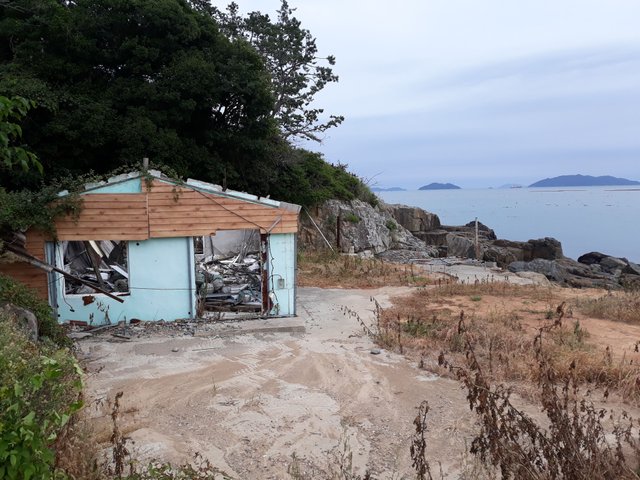Information Finding Championship- Season 1: Round 24 entry- Dilapidated

This post is an entry for the Information Finding Championship hosted by @apolymask.
The theme of this round is etymology, if you are interested in joining you can find more information right here.
Okay, so this was an exercise that I had for my Development of English class back in uni. It was to take your favorite word and figure out its etymology, origin, and usage of the word. One of my favorite words that do not get enough attention is, dilapidated. I learned this word in middle school as a vocabulary word, and I loved the sound of it. It is pretty much all dental consonants (tongue against the teeth), so you are just spitting out the word, and it goes up and down in your mouth as you say it. Seriously, say the word slowly, and you will understand what I mean. Anyways, to its history.
Dilapidated
The Origin of dilapidated- first before looking at dilapidated, we should first look at dilapidate.
Referring to our friend Oxford we can find it's origin as follows:
Early 16th century (in the sense ‘waste, squander’): from Latin dilapidat- ‘demolished, squandered’, from the verb dilapidare, literally ‘scatter as if throwing stones’, from di- ‘apart, abroad’ + lapis, lapid- ‘stone’.
So, I like how that is what the word comes to, 'scatter as if throwing stones.' So if something dilapidates, it is falling apart. If we would now turn our attention back to the word 'dilapidated', we see that it didn't come about till later than you would expect.
According to Dictionary.com the definition goes as follows:
reduced to or fallen into partial ruin or decay, as from age, wear, or neglect.
Then its first recorded usage is not until 1800-10. That is somewhat strange, isn't it? Well, considering its Latin origin, the word probably remained within the Latin-speaking world for the longest time until making into France. Then, when it made it into English, it was borrowed into the language. Because Shakespeare never uses the word 'dilapidate' or 'dilapidated,' considering his vast vocabulary, I would assume that the word didn't catch on into English. His career also started in the mid 16th century, so there would have been time for the word to catch on.
Now, how often do you hear the word dilapidate or dilapidates? Not as often as dilapidated, I assume. Well, when the word was borrowed into the English language, considering that it is a 'weak or regular' verb we just tacked on that -ed ending and called it our own.
So now, next time you see a rundown building like the one above, just imagine it being made of stone and all those stones just falling apart, ergo it is dilapidated. 😎
Etymology
For the term etymology I found this in Oxford:
The study of the origin of words and the way in which their meanings have changed throughout history.
Then for the breakdown of the word I turned to Wikipedia:
The word etymology derives from the Greek word ἐτυμολογία (etumología), itself from ἔτυμον (étumon), meaning "true sense", and the suffix -logia, denoting "the study of".[2][3]
In linguistics, the term etymon refers to a word or morpheme (e.g., stem[4] or root[5]) from which a later word derives. For example, the Latin word candidus, which means "white", is the etymon of English candid.
So, breaking it down etymology is, 'the study of true sense.' Makes sense doesn't it? We are taking a word and breaking it down to what it means.
Okay, that is what I have for this round. I hope you all learned something new today. 😁
I tend to write about life in Korea as a foreigner, food, photos from trips, and things teaching related. If that interest you and you like this post, please give me a vote and follow 👍
Fellow minnows can use Busy and Steemfollower to get more upvotes and followers, my referral links are below respectively:
https://busy.org/i/@mr-bike
https://steemfollower.com/?r=14715
Until then,
Ride on!

I like words that have a good mouth-feel.
So interesting! Isn't it funny how word meanings change over the course of time.
Yeah, it is also sad when words get taken and given a negative connotation. A lot of them about the LGBT community or other marginalized groups. On the other hand, it is refreshing when those same words are taken back by the communities as symbols of endurement.
A new word, I wonder how many new words have been made since 1800. I saw a story awhile back about how many words a year Merriam-Webster adds to and subtracts from their dictionary, but was unable to find it again. I did find one story that said in 2018 850 new words were added.
There is a whole study behind that field of making new words. The rapid growth of technology has also aided in this. I forgot what it was called but somebody tried to coin a bunch of internet words in the 90s they were what you would think if your grandparents make text shorthand speech. The words never caught on, but he was onto something. :)
Dilapidated sure is an interesting word indeed! That is neat how it makes such motions inside the mouth when you say it, language is weird sometimes... I like really complex words like that though. Cool entry! Thanks for sharing!